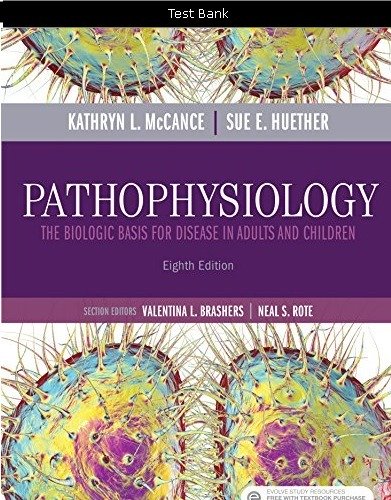Pathophysiology The Biologic Basis for Disease in Adults and Children 8th Edition Test Bank:
The Test Bank for Pathophysiology: The Biologic Basis for Disease in Adults and Children, 8th Edition is a valuable resource for understanding pathophysiology concepts. This updated edition includes more than 1,300 full-color illustrations and photographs to aid in identifying normal anatomy and physiology, as well as changes in function due to disease. A new chapter on obesity and nutritional disorders, as well as expanded coverage of rare diseases and epigenetics, makes this text the most comprehensive and authoritative on the market. With easy-to-read, in-depth descriptions of disease, disease etiology, and disease processes, this text helps students understand the what, how, and why of pathophysiology.
Table of Contents
Part 1: CENTRAL CONCEPTS OF PATHOPHYSIOLOGY: CELLS AND TISSUES
Unit I: THE CELL
1. Cellular Biology
2. Altered Cellular and Tissue Biology: Environmental Agents
3. The Cellular Environment: Fluids and Electrolytes, Acids and Bases
Unit II: GENES AND GENE-ENVIRONMENT INTERACTION
4. Genes and Genetic Diseases
5. Genes, Environment-Lifestyle, and Common Diseases
6. Epigenetics and Disease
Unit III: MECHANISMS OF SELF-DEFENSE
7. Innate Immunity: Inflammation
8. Adaptive Immunity
9. Alterations in Immunity and Inflammation
10. Infection
11. Stress and Disease
Unit IV. CELLULAR PROLIFERATION: CANCER
12. Cancer Biology
13. Cancer Epidemiology
14. Cancer in Children
Part 2: PATHOPHYSIOLOGIC ALTERATIONS: ORGANS AND SYSTEMS
Unit V: THE NEUROLOGIC SYSTEM
15. Structure and Function of the Neurologic System
16. Pain, Temperature Regulation, Sleep, and Sensory Function
17. Alterations in Cognitive Systems, Cerebral Hemodynamics, and Motor Function
18. Disorders of the Central and Peripheral Nervous Systems and the Neuromuscular Junction
19. Neurobiology of Schizophrenia, Mood Disorders, and Anxiety Disorders
20. Alterations of Neurologic Function in Children
Unit VI: THE ENDOCRINE SYSTEM
21. Mechanisms of Hormonal Regulation
22. Alterations of Hormonal Regulation
23. Obesity and Disorders of Nutrition NEW
Unit VII: THE REPRODUCTIVE SYSTEMS
24. Structure and Function of the Reproductive Systems
25. Alterations of the Female Reproductive System
26. Alterations of the Male Reproductive System
27. Sexually Transmitted Infections
Unit VIII: THE HEMATOLOGIC SYSTEM
28. Structure and Function of the Hematologic System
29. Alterations of Erythrocyte, Platelet, and Hemostatic Function
30. Alterations of Leukocyte and Lymphoid Function
31. Alterations of Hematologic Function in Children
Unit IX: THE CARDIOVASCULAR AND LYMPHATIC SYSTEMS
32. Structure and Function of the Cardiovascular and Lymphatic Systems
33. Alterations of Cardiovascular Function
34. Alterations of Cardiovascular Function in Children
Unit X: THE PULMONARY SYSTEM
35. Structure and Function of the Pulmonary System
36. Alterations of Pulmonary Function
37. Alterations of Pulmonary Function in Children
Unit XI: THE RENAL AND UROLOGIC SYSTEMS
38. Structure and Function of the Renal and Urologic Systems
39. Alterations of Renal and Urinary Function
40. Alterations of Renal and Urinary Tract Function in Children
Unit XII: THE DIGESTIVE SYSTEM
41. Structure and Function of the Digestive System
42. Alterations of Digestive Function
43. Alterations of Digestive Function in Children
Unit XIII: THE MUSCULOSKELETAL SYSTEM
44. Structure and Function of the Musculoskeletal System
45. Alterations of Musculoskeletal Function
46. Alterations of Musculoskeletal Function in Children
Unit XIV: THE INTEGUMENTARY SYSTEM
47. Structure, Function, and Disorders of the Integument
48. Alterations of the Integument in Children
Unit XV: MULTIPLE INTERACTING SYSTEMS
49. Shock, Multiple Organ Dysfunction Syndrome, and Burns in Adults
50. Shock, Multiple Organ Dysfunction Syndrome, and Burns in Children



John –
Great stuff. Thank you recommend it
Noe –
Thank you once again Recommend it